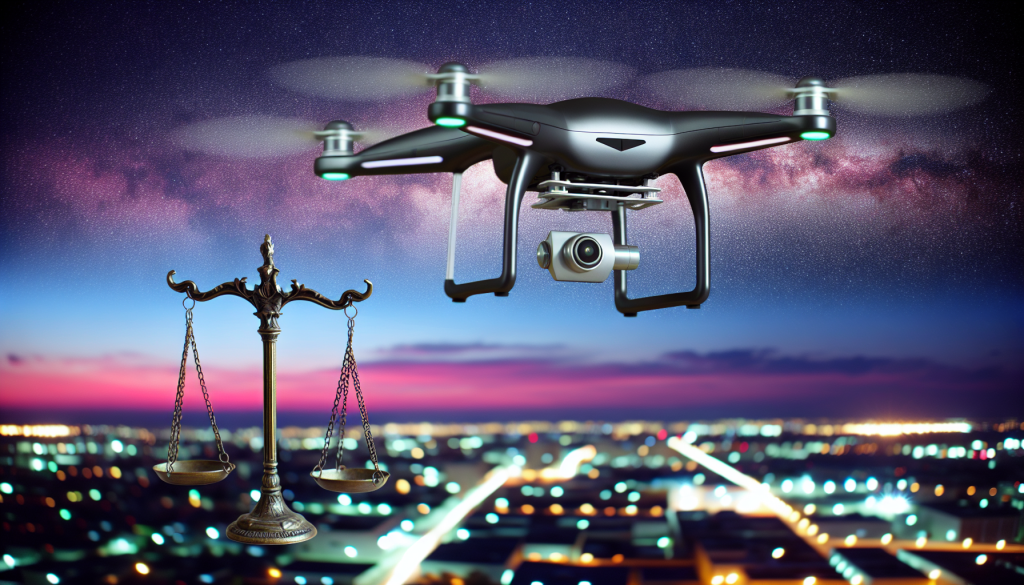The Legal and Ethical Imperatives of AI-Enabled Drones
The landscape of modern warfare is undergoing a seismic shift with the emergence of artificially intelligent drones, or unmanned aerial vehicles (UAVs). These technological marvels, now employed not just for surveillance but also for cross-border military operations and precision strikes, pose significant challenges for international law and ethics. In 2023, at least 19 nations have conducted drone strikes, highlighting the urgent need for a global conversation about compliance with established legal standards.
Legal and Ethical Challenges Posed by AI-Enabled Drones
AI-enabled drones bring forth a plethora of substantial legal ramifications, intertwined with ethical concerns. Under the auspices of international legal regimes such as the UN Charter, international humanitarian law (IHL), and international human rights law (IHRL), these UAVs threaten to challenge established norms. Central to this dialogue is the concept of state sovereignty, which is often undermined by drone operations that occur without the consent of the host state. For example, strikes undertaken by the U.S. in regions such as Pakistan, Yemen, and Somalia may contravene Article 2(4) of the UN Charter, asserting the inviolability of state boundaries.
While states frequently invoke Article 51, claiming self-defense, such assertions lack concrete evidence of imminent threats. The ambiguity surrounding these claims, coupled with a decreasing commitment to proportionality assessments, raises red flags. The principles of distinction — ethics demanding the differentiation between combatants and civilians — and precaution become increasingly blurred, inviting questions about the lawful use of military force.
Ethically, the rise of autonomous weapon systems (AWSs) presents a daunting dilemma. Without comprehensive human oversight, these systems struggle to contextually discern between various actors in a conflict, increasing the risk of civilian casualties. The accountability gap becomes more pronounced, as the absence of human agency complicates the responsibility for potential war crimes, further undermining IHL.
The legal obligations faced by EU member states add another layer of complexity. The EU AI Act, although exempting military applications, stresses values such as transparency and human oversight. The challenge lies in balancing these ethical responsibilities against the potential for dual-use proliferation, where technologies designed for civilian purposes could be adapted for military ends, compromising the EU’s ethical leadership.
Moreover, the normalization of drone warfare raises critical ethical questions regarding risk and deterrence. The lower physical and political stakes associated with UAV deployment may hasten the move toward conflict, eroding traditional barriers against military engagement. This notion of “riskless warfare” garners criticism and could diminish a state’s international reputation, particularly if it encounters civilian hardship in the process.
Cybersecurity and Socioeconomic Implications
An alarming dimension of deploying AI in warfare is the cybersecurity vulnerabilities that accompany it. Drones, especially those reliant on AI, can fall prey to cyberattacks that may jeopardize targeting accuracy, leading to unlawful strikes. Such risks balloon dramatically when these systems are integrated into a nation’s nuclear command and control frameworks, exemplifying moral irresponsibility when lives are lost due to inadequate security measures.
The socioeconomic ramifications are equally pressing. Increased automation in military operations demands fewer human operators, giving rise to concerns about job displacement in defense sectors. Without proactive retraining initiatives, this trend could amplify social inequality and alienation, fostering discontent within communities traditionally supportive of military engagements.
Furthermore, the discord between proclaimed ethical commitments and operational realities casts a shadow on state integrity. While many nations, particularly within the EU, assert support for human rights and ethical governance, inconsistencies in military AI practices erode public trust and damage credibility on the global stage.
The Rule of Law and its Erosion
These challenges signal a worrying trend that threatens the fabric of the rule of law. Defined by ideals of accountability, transparency, and equitable application of legal principles, the rule of law demands adherence from all states, irrespective of their power. Yet, clandestine drone operations, unilateral legal interpretations, and inconsistent enforcement of international norms signify a grim erosion of these foundational principles.
The deployment of AI in military strategies cannot and should not excuse states from moral accountability or legal scrutiny. Deviating from established legal protocols in drone warfare risks collapsing the normative frameworks that govern international relations and humanitarian conduct.
Pathways for Improvement: Legal and Institutional Reform
To rejuvenate the rule of law and address the challenges posed by AI-enabled drones, both international and regional reforms are essential. On an international level, states invoking self-defense must transparently report their UAV operations under Article 51, detailing the legality, the nature of the threat, and proportionality assessments — all of which should be publicly accessible.
The UN Secretariat could benefit from establishing a platform for these submissions, modeled after the UN Treaty Series, enhancing governmental accountability. Additionally, instituting a UN Special Rapporteur or Panel focused on AI and targeted killings could facilitate comprehensive reviews of state adherence to IHL and IHRL, with insights delivered to the General Assembly and Security Council.
Reforming the UN Security Council’s methods to mandate the automation of legal reviews and circulating reports on UAV strikes can fortify legal obligations and responsiveness. Meanwhile, a new binding protocol under the Convention on Certain Conventional Weapons should be created, outlining the definitions of autonomous UAVs, imposing strict oversight mandates, and necessitating post-strike investigations.
Within the European context, legislations should prohibit completely autonomous lethal drones, emphasizing adherence to necessity and proportionality principles. A European Military AI Ethics Council could play a crucial role in assessing UAV operations, ensuring compliance with the Common Security and Defence Policy.
To foster a culture of transparency, the EU could release annual white papers discussing military AI and UAV incidents, while enhancing the European Parliament’s competencies in oversight and facilitating independent legal evaluations through civil society engagement.
In summary, addressing the pressing challenges posed by AI-enabled drones necessitates a committed and multifaceted approach to reform, one that ensures compliance with established legal and ethical standards. The preservation of human dignity and adherence to the rule of law hinge upon states’ capacity to adapt their military frameworks to meet the imperatives of contemporary challenges in drone warfare.

